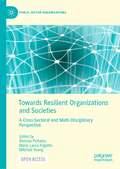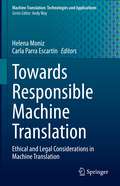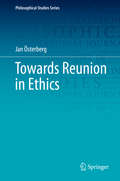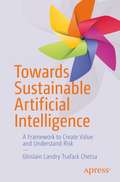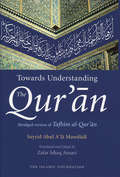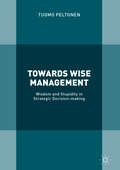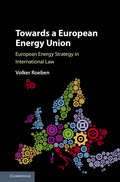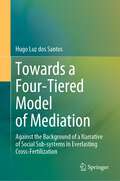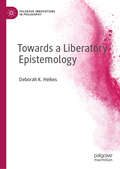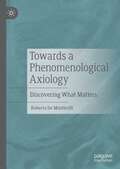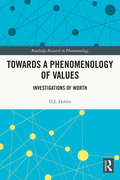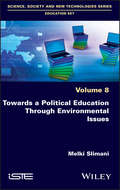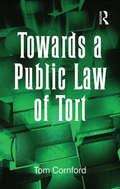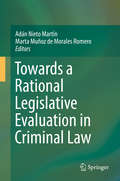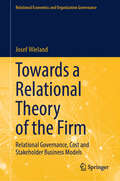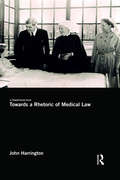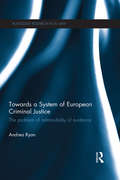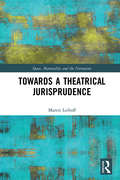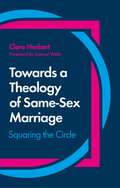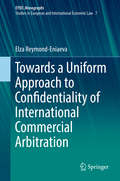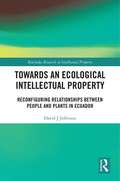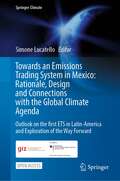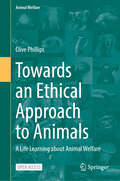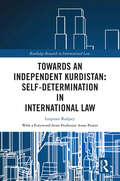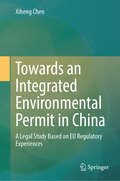- Table View
- List View
Towards Resilient Organizations and Societies: A Cross-Sectoral and Multi-Disciplinary Perspective (Public Sector Organizations)
by Rómulo Pinheiro Maria Laura Frigotto Mitchell YoungThis open access book brings together scholars in the fields of management, public policy, regional studies, and organization theory around the concept of resilience. The aim is to provide a more holistic understanding of the complex phenomenon of resilience from a multi-sectorial, cross-national, and multidisciplinary perspective. The book facilitates a conversation across diverse disciplinary specializations and empirical domains. The authors contribute both to theory testing and theory development and provide key empirical insights useful for societies, organizations, and individuals experiencing disruptive pressures, not least in the context of a post-COVID-19 world. Diverse chapters are held together by a clear organization of the volume across levels of analysis (resilience in organizations and societies) and by an original perspective on resilience derived from an extended review, by the editors, of the existing literature and knowledge gaps, according to which each of the individual chapter contributions is positioned and connected to.
Towards Responsible Machine Translation: Ethical and Legal Considerations in Machine Translation (Machine Translation: Technologies and Applications #4)
by Helena Moniz Carla Parra EscartínThis book is a contribution to the research community towards thinking and reflecting on what Responsible Machine Translation really means. It was conceived as an open dialogue across disciplines, from philosophy to law, with the ultimate goal of providing a wide spectrum of topics to reflect on. It covers aspects related to the development of Machine translation systems, as well as its use in different scenarios, and the societal impact that it may have. This text appeals to students and researchers in linguistics, translation, natural language processing, philosophy, and law as well as professionals working in these fields.
Towards Reunion in Ethics (Philosophical Studies Series #138)
by Jan ÖsterbergThis posthumous publication attempts to answer the question of what moral code is the most reasonable. Philosophers often turn to consequentialism or deontological ethics to address this issue. As the author points out, each has valid arguments but each is unable to get the other side to agree. To rectify this, he proposes a third way. Inside, readers will discover a theory that tries to do justice to both sides. The author first details consequentialism and deontological ethics. He also explains their fundamental conflict. One holds the view that you should do what has the best consequences. The other believes that there are actions which are wrong to do even if they have the best consequences. Next, the volume considers various ways to solve this conflict. Would rejecting one theory work? Or, is it possible to somehow reconcile them. The author shows why these solutions fail. He then goes on to present his own. The resulting contractual theory brings together the two opposing ethical convictions. It proposes that what is right and wrong depends on what norms people would agree to. Throughout, coverage explores the psychological, sociological, and historical background of the moral theories discussed. The reason is that moral theories are embedded in social and psychological contexts. They are better understood when the contexts are explicit. This key feature distinguishes the volume from other works in moral philosophy.At the time of his death in July 2011, Jan Österberg was close to completing this manuscript. It was taken up and fully completed by Erik Carlson and Ryszard Sliwinski, both of Uppsala University.
Towards Sustainable Artificial Intelligence: A Framework to Create Value and Understand Risk
by Ghislain Landry Tsafack ChetsaSo far, little effort has been devoted to developing practical approaches on how to develop and deploy AI systems that meet certain standards and principles. This is despite the importance of principles such as privacy, fairness, and social equality taking centre stage in discussions around AI. However, for an organization, failing to meet those standards can give rise to significant lost opportunities. It may further lead to an organization’s demise, as the example of Cambridge Analytica demonstrates. It is, however, possible to pursue a practical approach for the design, development, and deployment of sustainable AI systems that incorporates both business and human values and principles. This book discusses the concept of sustainability in the context of artificial intelligence. In order to help businesses achieve this objective, the author introduces the sustainable artificial intelligence framework (SAIF), designed as a reference guide in the development and deployment of AI systems. The SAIF developed in the book is designed to help decision makers such as policy makers, boards, C-suites, managers, and data scientists create AI systems that meet ethical principles. By focusing on four pillars related to the socio-economic and political impact of AI, the SAIF creates an environment through which an organization learns to understand its risk and exposure to any undesired consequences of AI, and the impact of AI on its ability to create value in the short, medium, and long term. What You Will Learn See the relevance of ethics to the practice of data science and AI Examine the elements that enable AI within an organization Discover the challenges of developing AI systems that meet certain human or specific standards Explore the challenges of AI governance Absorb the key factors to consider when evaluating AI systems Who This Book Is For Decision makers such as government officials, members of the C-suite and other business managers, and data scientists as well as any technology expert aspiring to a data-related leadership role.
Towards Understanding the Qur'an: English Only Edition
by Sayyid Abul Mawdudi Zafar Ishaq AnsariAn immense understanding of the Qur'an is offered here, a vast treasure of knowledge and deep insight and a valuable exposition of some social, political, economic and legal teachings of the Qur'an. But what makes this work unique is that it presents the Qur'an as a book to be lived by. With thousands of notes, an introduction and comprehensive index.
Towards Wise Management: Wisdom and Stupidity in Strategic Decision-making
by Tuomo PeltonenThis book contributes to the discussion on wisdom in management, leadership and strategy by developing a unique theoretical approach. Integrating rational-analytical, intuitive and philosophical dimensions of wise decision-making, it advocates a broadly Platonic-Socratic view on wisdom. Applying a developed framework of wisdom dynamics, it analyses a number of decision-making case studies in order to discuss the potential of and obstacles to the use of wisdom in broader organizational trends, from the Cuban Missile Crisis to the downfall of Nokia.
Towards a European Energy Union: European Energy Strategy in International Law
by Volker RoebenThe European Union is poised to establish a genuine European Energy Union with the new powers conferred on it by the Lisbon Treaty. Since 2014, it has been developing and implementing an energy strategy that responds to the three overarching priorities of climate change, political security, and economic competitiveness by 2030. The European Energy Union aims to provide secure, sustainable and affordable energy throughout the cycle of production, transport and consumption. This book outlines the legal regime underpinning this regulatory strategy, which integrates EU law with international law and with the law of the member states and affiliated states. It analyses and explains the increasing interaction between these legal orders in achieving the shared objective of transforming the European and global energy systems. This book will appeal to scholars and students of energy law and Policy at both European and international levels.
Towards a Four-Tiered Model of Mediation: Against the Background of a Narrative of Social Sub-systems in Everlasting Cross-Fertilization
by Hugo Luz SantosUnderpinned by a hybrid methodology (ranging from social sciences to human sciences), this book parses mediation in four perspectives, which stands as an unparalleled methodological approach so far.Mediation has long been tethered to piecemeal and haphazard approaches, which have flatly failed to capture the gist of the uniqueness of this (often) poorly latched on (and poorly understood) dispute resolution mechanism. This book argues that, in order to fully grasp the richness of such dispute resolution mechanism, mediation must be parsed in four tiers. The first tier is the social dynamics of mediation. The second tier is the cultural dynamics of mediation. The third tier is the legal dynamics of mediation. The fourth tier is the cross-border and cross-cultural dynamics of mediation.Taken together, the four tiers that premise the four-tiered model of mediation seek to unlock the finding in view of which law and social reality are tightly interlocked. In this vein, it is the underlying social reality of a given jurisdiction that should dictate the design of a pre-suit court-connected mandatory mediation with an easy opt-out, a central claim of both social dynamics of mediation (the first tier of the four-tiered model of mediation) and legal dynamics of mediation (the third tier of the four-tiered model of mediation).
Towards a Liberatory Epistemology (Palgrave Innovations in Philosophy)
by Deborah K. HeikesThis book offers a compelling examination of our moral and epistemic obligations to be reasonable people who seek to understand the social reality of those who are different from us. Considering the oppressive aspects of socially constructed ignorance, Heikes argues that ignorance produces both injustice and epistemic repression, before going on to explore how our moral and epistemic obligations to be understanding and reasonable can overcome the negative effects of ignorance. Through the combination of three separate areas of philosophical interest- ignorance, understanding, and reasonableness- Heikes seeks to find a way to correct for epistemological and moral injustices, satisfying needs in feminist theory and critical race theory for an epistemology that offers hope of overcoming the ethical problem of oppression.
Towards a Phenomenological Axiology: Discovering What Matters
by Roberta De MonticelliThis book attempts to open up a path towards a phenomenological theory of values (more technically, a phenomenological axiology). By drawing on everyday experience, and dissociating the notion of value from that of tradition, it shows how emotional sensibility can be integrated to practical reason. This project was prompted by the persuasion that the fragility of democracy, and the current public irrelevance of the ideal principles which support it, largely depend on the inability of modern philosophy to overcome the well-entrenched skepticism about the power of practical reason. The book begins with a phenomenology of cynical consciousness, continues with a survey of still influential theories of value rooted in 20th century philosophy, and finally offers an outline of a bottom-up axiology that revives the anti-skeptical legacy of phenomenology, without ignoring the standards set by contemporary metaethics.
Towards a Phenomenology of Values: Investigations of Worth (Routledge Research in Phenomenology)
by D.J. HobbsThis book provides a framework for phenomenological axiology. It offers a novel account of the existence and nature of values as they appear in conscious experience. By building on previous approaches, including those of Edmund Husserl, Max Scheler, and Nicolai Hartmann, the author develops a unique account of what values really are. After explicating and defending this account, he applies it to several of the most difficult questions in axiology: for example, how our experiences of value can differ from those of others without reducing values to subjective judgments or how the values we experience are connected to the volitional acts that they inspire. This provides satisfactory answers to certain fundamental questions concerning the basic structure of value-experiences. Accordingly, this book represents a novel step forward in phenomenological axiology. Towards a Phenomenology of Values will be of interest to scholars and advanced students working in phenomenology and value theory.
Towards a Political Education Through Environmental Issues
by Melki SlimaniThe growing field of political education through environmental issues is organized around processes, which reach beyond the formal ones found in academic disciplines and national curricula into informal processes (such as social mobilization) and nonformal processes (such as those found in various international educational recommendations). Using theoretical approaches from the fields of political philosophy and the social sciences, this book develops a simultaneously conceptual and analytical framework for the political in educational content involving environmental issues. This framework is then used to empirically analyze educational content on sustainable development formulated by UNESCO, as well as the Tunisian curriculum. The theoretical and empirical studies carried out in this book lead to proposed curriculum tags for political education through environmental issues, with the intent of opening this field to inclusion in the didactics of curriculum research.
Towards a Public Law of Tort
by Tom CornfordPresenting a new approach to the problem of public authority liability, this volume provides a theoretical foundation in the form of principles of administrative liability that are both normatively sound and consonant with other recognized legal principles. These principles are used as criteria by which to judge the current law and as a guide to reform. Such reform could be brought about by judicial development of the law, and this volume explains how. It considers both the procedural and the substantive divides between public and private law and explains the proposed solution's relation to the forms of public authority liability already present under European Community law and the Human Rights Act. Focusing in particular on UK law, the book is also relevant to other Commonwealth countries and will be of interest to scholars and practitioners of both tort and public law.
Towards a Rational Legislative Evaluation in Criminal Law
by Adán Nieto Martín Marta Muñoz de Morales RomeroThis book launches a debate on the need to evaluate criminal policies and, what is more complex and ambitious, to develop an evaluation method. The contributions address topics such as the general methodology for evaluating public policy, preparing criminal statistics, and analyzing costs, cost-effectiveness and cost benefits. Additionally, the work explores the state of affairs in various countries including Spain, Sweden, USA, Germany and in the EU. It also examines issues such as the relationship between legislative evaluation and criminal principles and the constitutional courts' control over criminal acts.
Towards a Relational Theory of the Firm: Relational Governance, Cost and Stakeholder Business Models (Relational Economics and Organization Governance)
by Josef WielandThis book lays the groundwork for a relational theory of the firm as a network of stakeholder resources and interests. Drawing on the author’s earlier publications on relational economics as the political economy of a global cooperative economy or stakeholder capitalism, it explores the governance and managerial implications of a relational economy for firms, while also critically revisiting the traditional and resource-based view of the firm. In turn, it explains concepts such as relational governance, relational costs, relational spaces, rent from cooperation, and shared value creation, as well as a dynamic and process-oriented relational business model. The book discusses the epistemological and methodological prerequisites of a relational theory of the firm and addresses their theoretical taxonomy. A relational theory of the firm is a work in progress; the book represents an invitation to join this theoretical and empirical undertaking.
Towards a Rhetoric of Medical Law: Against Ethics
by John HarringtonChallenging the dominant account of medical law as normatively and conceptually subordinate to medical or bioethics, this book provides an innovative account of medical law as a rhetorical practice. The aspiration to provide a firm grounding for medical law in ethical principle has not yet been realized. Rather, legal doctrine is marked, if anything, by increasingly evident contradiction and indeterminacy that are symptomatic of the inherently contingent nature of legal argumentation. Against the idea of a timeless, placeless ethics as the master discipline for medical law, this book demonstrates how judicial and academic reasoning seek to manage this contingency, through the deployment of rhetorical strategies, persuasive to concrete audiences within specific historical, cultural and political contexts. Informed by social and legal theory, cultural history and literary criticism, John Harrington’s careful reading of key judicial decisions, legislative proposals and academic interventions offers an original, and significant, understanding of medical law.
Towards a System of European Criminal Justice: The Problem of Admissibility of Evidence (Routledge Research in EU Law)
by Andrea RyanWith the developing landscape of a European criminal justice sphere comes an increasing imperative for scholars and practitioners to gain some insight into the diversity that exists in the criminal justice systems of European Union Member States. This book explores the mutual admissibility of evidence; a facet of EU criminal justice that is proving difficult to realise. While the Lisbon Treaty places the issue of mutual admissibility of evidence squarely on the agenda, the EU instruments to date have not succeeded in achieving this goal. Andrea Ryan argues that part of the reason for this failure is that while the mutual recognition instruments have focussed on the issue of gathering evidence and safeguarding suspects’ rights, they have not addressed how evidence is to be presented and contested at trial. Drawing upon case studies from Ireland, France and Italy, and adopting a legal cultural perspective, and enriched by the author’s observations of criminal trials, the book presents a detailed analysis of the developments to date in EU criminal justice and evidence law. By examining evidence practices the book asks whether the inquisitorial and accusatorial traditions within the EU systems are too irreconcilable to achieve a system of mutual admissibility of evidence. The book will be of great interest and use to academics and practitioners with an interest in European and comparative criminal justice, criminal procedure, human rights and socio-legal studies.
Towards a Theatrical Jurisprudence
by Marett LeiboffThis book brings the insights of theatre theory to law, legal interpretation and the jurisprudential to reshape law as a practice of response and responsibility. Confronting a Baconian antitheatrical legality embedded in its jurisprudences and interpretative practices, Marett Leiboff turns to theatre theory and practice to ground a theatrical jurisprudence, taking its cues from Han-Thies Lehmann’s conception of the post-dramatic theatre and the early work of theatre visionary Jerzy Grotowski. She asks law to move beyond an imagined ideal grounded in Aristotelian drama and tragedy, and turns to the formation of the legal interpreter ・ lawyer, judge, jurisprudent ・ as fundamental to understanding what’s “noticed” or not noticed in law. We “notice” most easily through that which is written into the body of the legal interpreter, in a way that can’t be replicated through law’s standard practices of thinking and reasoning. Without more, thinking and reasoning are the epitome of antitheatricality legality; a set of theatrical antonyms, including transgression and instinct, offer instead a set of possibilities through which to reconceive assumptions and foundational concepts etched into the legal imaginary. And by turning to critical dramaturgy, the book reveals that the liveliness that sits behind theatrical jurisprudence isn’t a new concept in law at all, but has a long pedigree and lineage that had been lost and hidden. Theatrical jurisprudence, which demands an awareness of self and beyond self, grounds a responsiveness that can’t be found within doctrine, principle, or the technocratic, but also challenges us to notice what it is we think we know as well as what we know of lives in law that aren’t our own. The book will be of interest to scholars and students in the field of jurisprudence, legal theory, theatre and performance studies, cultural studies and philosophy.
Towards a Theology of Same-Sex Marriage: Squaring the Circle
by Clare HerbertA transformative exploration of queer theology and the debate around same-sex marriage within the Church. Clare Herbert draws on her experience as a priest within the Church of England in a committed same-sex relationship and considers the questions that have shaped religious debate for many years. This book explores the concept of same-sex marriage in relation to the heteronormative definition of marriage, and its effect on past understandings of the sacrament. Interweaving stories from Christians struggling to reconcile their faith with their sexuality alongside wider queer theology and the theology of marriage, Herbert explores the unique understanding of God provided by the experience of committed same-sex love , and lays the groundwork for redefining the traditional definition of marriage.
Towards a Uniform Approach to Confidentiality of International Commercial Arbitration (European Yearbook of International Economic Law #7)
by Elza Reymond-EniaevaThe book deals with confidentiality as one of the most controversial issues in international commercial arbitration. On the one hand, it is widely recognized that confidentiality is an important advantage of arbitration which contributes to its attractiveness. On the other hand, there is no uniform regulation in national legislations, arbitration rules, and other relevant sources as to the scope or even to the existence of a duty of confidentiality. A uniform approach to confidentiality of international commercial arbitration is possible. The best way to achieve it would be through harmonization of national arbitration laws which should impose a confidentiality obligation subject to certain exceptions. The purpose of maintaining confidentiality would be to protect primarily the parties from undesirable leaks that can be avoided and to protect arbitration as an institution. As to a systematic publication of arbitral awards without identifying the parties’ identity, it is desirable and should be the goal.
Towards an Ecological Intellectual Property: Reconfiguring Relationships Between People and Plants in Ecuador (Routledge Research in Intellectual Property #1)
by David J JeffersonThis book focuses on analysing how legal systems set the terms for interactions between human beings and plants. The story that the book recounts is one of experimental lawmaking in Ecuador, a country where over the past decade, governmental officials and civil society advocates have attempted to reconfigure how human individuals and institutions relate to nature, by following an "eco-centric" approach to lawmaking. In doing so, Ecuadorian legislators, administrators, and judges have taken seriously the ontologies of non-human entities, including plants, through a process that has required the continuous navigation of tensions with certain "logics" that pervade conventional legal regimes. The book endeavours to disrupt these conventional assumptions and approaches to lawmaking by taking seriously alternative strategies to reconstitute interactions between people and plants. In doing so, the book argues in favour of an "ecological turn" in laws that govern vegetal life. The analysis is based on a close examination of the experiences that lawmakers in Ecuador have had when experimenting with innovative approaches to re-form relationships between human and non-human beings. Concretely, these experiments have yielded constitutional, legislative, and regulatory changes that inform the inquiry of how intellectual property and plant genetic resources laws – both in Ecuador and worldwide – could become more "ecological" in nature. The argument that the book develops is based on extensive ethnographic fieldwork and empirical research in Ecuador, complemented by archival and doctrinal legal analysis. The contents of the book will be of interest to an academic audience of legal scholars and postgraduate students in law, in addition to scholars and students in the fields of anthropology, sociology, socio-legal studies, and science and technology studies.
Towards an Emissions Trading System in Mexico: Outlook on the first ETS in Latin-America and Exploration of the Way Forward (Springer Climate)
by Simone LucatelloThis Open Access book provides detailed information about the incoming Mexican Emissions Trading System, including an analysis on why the system was implemented, how the system was designed, how it operates, how it could work, and how it could be strengthened by 2023 when it will be formally launched. This document is aimed at those who want to understand how an ETS can operate in an emerging economy. Although it has been written for experts and non-experts, this book does not provide the underlying theory of market-based instruments and emissions trading systems in general. The book can be read from start to finish, but can also be used as a reference for specific components of regional ETSs. The book draws upon a meticulous study of background documents and fieldwork from different authors to tell the story of how a Mexican ETS, the first of its kind in Latin America, can be set in the country. The emissions trading system cover many greenhouse gas emissions and has been hailed as one of the cornerstones of the Mexican climate policy. The book also examines and explains how the ETS is designed and implemented.
Towards an Ethical Approach to Animals: A Life Learning about Animal Welfare (Animal Welfare #26)
by Clive PhillipsIn two parts, this open access work offers a broad and often unconventional approach to animal ethics, written by a pioneer in animal welfare science and ethics. The author Clive Phillips, Australia's first professor of animal welfare, first describes his life experience and career in the field, which enabled him to provide thoughts and possible solutions to some of the key problems in human-animal relations following in section two. His memoirs describe a journey from privileged upbringing in the Christian tradition to confronting Australian livestock industries with some of their traditional practices. Experiences meeting livestock farmers, industry supporters and national representative bodies taught him new approaches to the ways in which we manage animals. After building one of the largest animal welfare centers worldwide, Clive Phillips retired and pursues his animal welfare mission independently. The second part introduces novel aspects that evolved with the author over several decades of involvement in animal welfare science. This part takes a wide perspective, asking how important and unique our animal kingdom is, how did it evolve and why, and what are the key issues for our treatment of other animals? It concludes by considering our future relationship with animals and how this will change with current developments in society and in particular contemporary attitudes toward the consumption of animals. This historical and futuristic look at animal ethics is unique, making this book a thought provoking read for all interested. The audience includes, but is not limited to, the areas of veterinary science, ethics and welfare, animal industries, universities and philosophy departments.
Towards an Independent Kurdistan: Self-Determination in International Law (Routledge Research in International Law)
by Loqman RadpeyKurdistan is among the world’s most notorious cases of self-determination denied, and the reasons why this outcome remains unachieved reveal as much about the biases of international law as they do about the merits of the case for Kurdistan. On the centenary of the Treaty of Lausanne, 24 July 1923, the last of the international instruments establishing the new international order after World War I, this book explores the potential blind spots of international law regarding its differential application in the Middle East. Tracing self-determination over the past century, the work explores how the law applies to Kurdish aspirations and to what extent the Kurds can rely upon the current law of self-determination to achieve internationally recognised statehood. The book offers an exhaustive historico-legal analysis of changing international legal concepts and geopolitical upheaval, providing a blueprint for Kurdish selfdetermination in international law. Shedding light on the law’s structural biases, it represents a comprehensive historico-legal account of Kurdish aspirations for territorial independence within international law literature, offering a guide to relevant legal problems. It will be of interest to students and academics focused on international law, specifically, peoplehood, statehood, secession, human rights law, political science, and anthropology. Moreover, policymakers, government officials working in peace and conflict, research and advocacy institutes, think tanks, as well as scholars of international relations, historians, political scientists, regional specialists, diplomats, and non-governmental organisation activists will find it a useful reference. The book also illuminates the human rights status of the Kurds in their host states, making it relevant to scholars and activists. Its findings have implications extending beyond Kurdistan to self-determination struggles in Scotland, Catalonia, Ukraine, and elsewhere.
Towards an Integrated Environmental Permit in China: A Legal Study Based on EU Regulatory Experiences
by Xiheng ChenThis book examines the extent to which the regulatory design of the emissions permit system in China, taking into account the EU's regulatory experience with integration and from the perspective of the specific Chinese situation, provides opportunities for or hinders the implementation of integrated pollution prevention and control. It was found that China's permitting system provides regulatory opportunities for integrated control of emissions to air, water, and land, but that some challenges remain, particularly in terms of environmental effectiveness and environmental trade-offs. This book is not only aimed at the academic community, but may also benefit policy makers by providing an explanation of the rationale for integrated environmental permitting, together with a critical reflection on the current state of emissions permitting in China. It may also be helpful to the ENGOs that focus on and are willing to comment on the choices of regulatory instruments to be made by the Chinese government, particularly in the light of achieving a high level of environmental protection as a whole.
